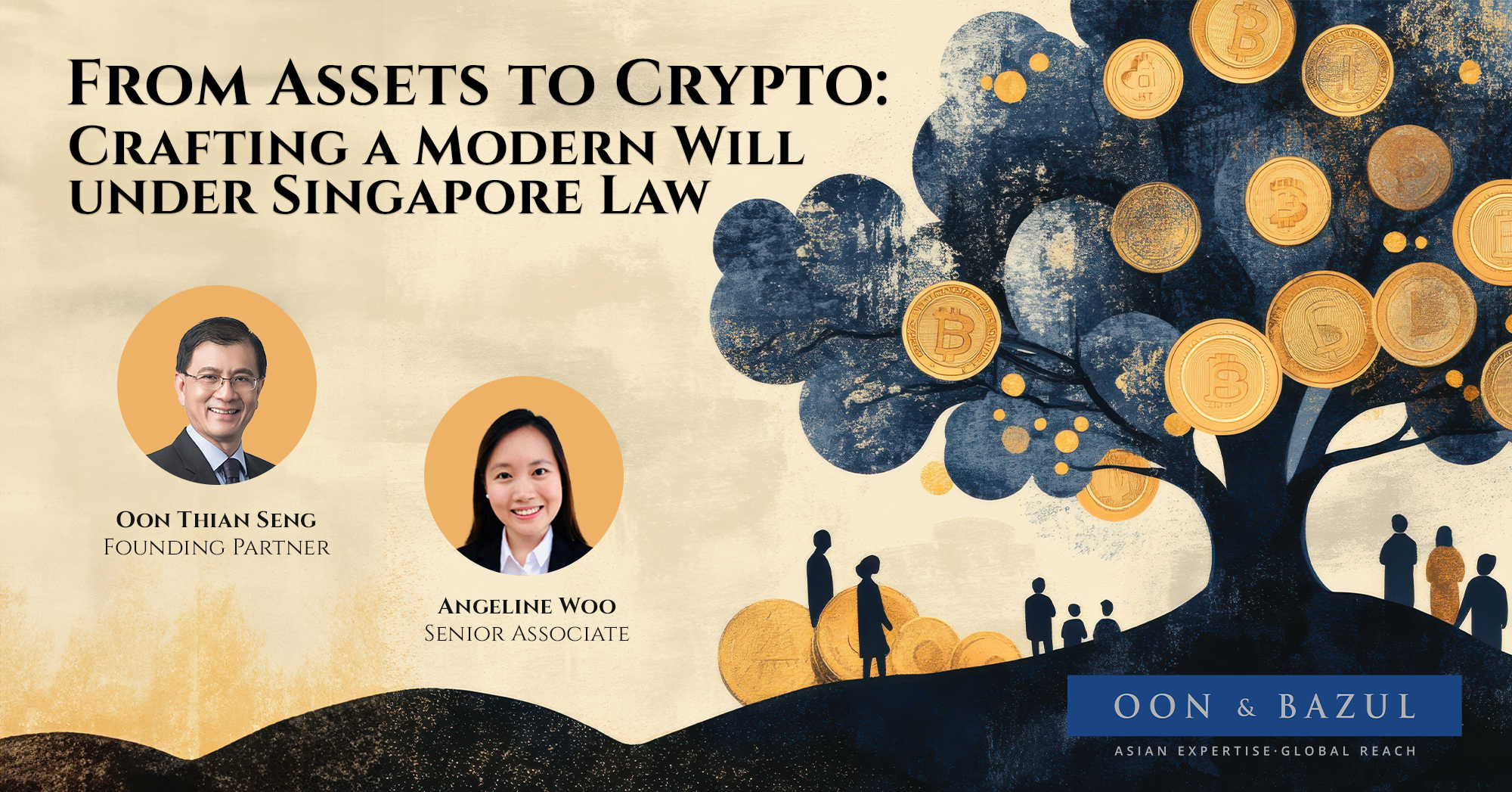From Assets to Crypto: Crafting a Modern Will under Singapore Law
Under Singapore law, a will is a legal document that outlines how a person’s assets will be distributed upon their death. In this modern world, a will remains a vital legal tool for managing wealth and safeguarding loved ones. With evolving asset types like digital properties in the form of cryptocurrencies and non-fungible tokens (NFTs), and global investments, a well drafted will ensures ones wishes are honoured and minimises potential conflicts.
- Background
In Singapore, wills are governed by the following acts: Wills Act 1838, the Probate and Administration Act 1934 and the Intestate Succession Act 1967.
- Key Requirements for a Valid Will in Singapore
To create a valid will under the Wills Act, the following conditions must be met:
a. Age Requirement
The person making the will, known as the testator, must be at least 21 years old.
b. Testamentary Capacity
The testator must (i) be of sound mind and (ii) understand the nature of the will and (iii) the people who might have a claim to their estate.
c. Written Form
A will must be in writing.
d. Witnessing Requirements
It must be signed in the presence of two witness by the testator. Crucially, witnesses must not be beneficiaries or spouses of beneficiaries under the will.
- Main Components of a Will
A comprehensive will should include personal details such as the full name, identification number, and address of the testator. It should also include a revocation clause to revoke any previous wills. Furthermore, the will should list out in detail the beneficiaries and appoint executors to manage the estate. Lastly, the will should contain a residuary clause, which addresses any assets not specifically mentioned.
- Cryptocurrency and NFTs in a Will
Cryptocurrencies are a form of digital currency that exist entirely in virtual space and utilize cryptography to secure transactions. They are distinct from traditional currencies, in that they do not have any physical form. Popular examples include Bitcoin, Ethereum, Solana, Dogecoin, and Tether.
On the other hand, NFTs (non-fungible tokens) are unique digital identifiers recorded on a blockchain that signify ownership and can be transferred. For instance, an NFT image is created through a string of code that generates the image and stores it on a decentralized file-sharing system like the InterPlanetary File System (IPFS). The metadata of the image is hashed using an algorithm, creating a unique identifier. Beeple’s NFT creation process is an example, where a token is generated and stored in his crypto wallet. As the wallet owner, he can transfer the token to another wallet, such as a buyer’s, upon receiving payment.
In Singapore, the courts have recognized cryptocurrencies and NFTs as property, granting them proprietary rights. The courts have clarified that NFTs consist of data encoded in a specific manner and securely stored on the blockchain ledger[1].

Everydays: The First 5000 Days by Beeple is a collage of 5000 images sold for $69.3 million in 2021
For effective estate planning, it is essential to list all cryptocurrencies and NFTs in your possession. This includes specifying the types of cryptocurrencies (e.g., Bitcoin, Tether, Ethereum), their exact quantities, and the unique token IDs of NFTs. Since cryptocurrencies are stored in digital wallets, it is crucial to provide executors with clear instructions on how to access these wallets. This may involve sharing login credentials and private encryption keys.
Upon death of the owner, the executor can follow the instructions set out in the will to distribute these assets. For example, if someone owns 50 units of Bitcoin stored in a crypto wallet on a specific platform, and the will states that these should be transferred to a beneficiary, the executor can use the login details and private keys to access the wallet and transfer the Bitcoin to the beneficiary’s crypto wallet.
- What Happens Without a Will?
If a person dies without a valid will, their estate is distributed according to the Intestate Succession Act 1967. The default order of distribution prioritizes: (i) spouse and children, (ii) parents, (iii) Siblings, (iv) grandparents and (vi) uncles and aunts.
- Storing
Meanwhile, one can store the will in a safe location (ie with a lawyer or in a safety deposit box). Furthermore, one can lodge the electronic copy of the will with the Wills Registry, maintained by Singapore Academy of Law. Information such as the following are kept in the Wills Registry: (i) Details of the testator; and (ii) Date of when the will was made.
- Probate and Administration of Estates
After the testator’s death, the executor applies for a Grant of Probate to administer the estate. If there is no will, an administrator must apply for Letters of Administration.
- Conclusion
To conclude, will-making in the modern context, has evolved to address the complexities of contemporary asset ownership. With the rise of cryptocurrencies, NFTs, and other non-traditional holdings, it is essential to ensure that these are included in one’s estate planning. Unlike physical assets, cryptocurrencies are stored in digital wallets and secured by private keys, making them challenging to access without proper documentation.
This article was authored by our Founding Partner Oon Thian Seng and Senior Associate Angeline Woo.
Having assets and business interests that are complex, valuable or spread across different countries exposes your private wealth to different hidden risks. Different legal, regulatory, and tax environments can have an unintended impact on you and your beneficiaries. Succession planning is imperative to ensure a seamless transition between current and future generations, creating a sustainable financial legacy.
At Oon & Bazul LLP, we strive to assist you in making this possible. By working with you, our lawyers can help customise estate planning and succession strategy that meets your goals and values. Our legal assistance includes business continuity, leadership training, life insurance management, and the establishment of wills and trusts to ensure a seamless transition of wealth to the next generation.
You may visit our Private Wealth & Family Office page to learn more about our practice.
You may download the PDF Copy of this article here.
[1] Janesh s/o Rajkumar v Unknown Person (“CHEFPIERRE”) [2023] 3 SLR 1191; [2022] SGHC 264



